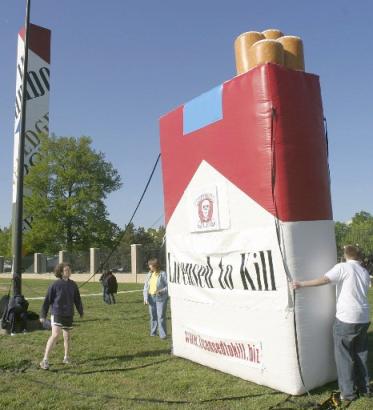GLOBAL
SOLIDARITY
AGAINST BIG TOBACCO

April 23-24, 2003
Richmond, VA
|
REVOKE
"LICENSE TO KILL" |
|
ALTRIA
SHAREHOLDERS MTG |
|
TEEN
ADVOCACY WORKSHOP |
|
Licensed
to Kill, Inc
We're Rich, You're Dead! ™ |
Photo credit: AP/Wayne Scarberry
|
Altria
Faces Protests, Accusations
at Annual Shareholder Meeting By
MICHAEL BUETTNER April 24 2003 RICHMOND, Va. -- A month after an Illinois judge's verdict in a smoking lawsuit nearly forced the company into bankruptcy, investors, demonstrators and corporate activists gathered Thursday for the annual meeting of shareholders of Altria Group Inc. It was the first such meeting since the company changed its name in January from Philip Morris Cos. Inc., but many of the issues and much of the cast of characters were similar to previous outings. About 100 demonstrators gathered at the gate of the company's cigarette-making complex where the meeting was held. Props included a giant inflated cigarette pack labeled "Licensed to Kill," a reference to a sham corporation recently chartered in Virginia by activists protesting what they see as lax corporate regulation. A sign held by one protester read, "Cigarettes = Weapons of Mass Destruction." Inside the meeting, the recent lawsuit was uppermost in many participants' minds. In his first meeting as chairman and chief executive officer, Louis C. Camilleri said he believes the company's Philip Morris USA tobacco manufacturing unit will be successful in appealing the Illinois judge's order to pay $10.1 billion for misleading smokers into believing light cigarettes are less harmful than regular brands. Last week, the judge slashed by half a $12 billion bond originally levied against Philip Morris to appeal the verdict. Philip Morris executives had said paying the full bond would drive the company to bankruptcy and force it to default on its share of the $206 billion promised over 25 years under the 1998 tobacco settlement. Camilleri said Thursday that the company "will now be asking for an expedited legal review" and noted that except for some small legal fees, "the entire amount of the bond will be returned to Philip Morris USA" if the verdict is overturned. While there are numerous other smoking-related lawsuits pending against the company, Camilleri said he is confident the company can defend itself. "We have the people, the perseverance and the clear resolve to work through even the most difficult litigation," he said. Camilleri noted that "a convergence of adverse factors," including a weak economy and sharp increases in some states' excise taxes on tobacco, caused Philip Morris USA's financial performance to lag last year. However, in answer to an investor's question, he said he is "very confident the Philip Morris USA will do very well in the future. I think the worst is behind it." The parent company's name change drew comment from other speakers. Katherine Mulvey, executive director of Massachusetts-based activist group Infact, accused the company of making the change to distance itself from its history as a tobacco company. Camilleri responded that "we are very proud of the Philip Morris name and very proud of our tobacco heritage." To a number of other activists--whose questions alleged or implied that Altria has engaged in strong-arm tactics against critics, improperly influenced the Bush administration to oppose international limits on tobacco marketing and condoned cigarette smuggling by Saddam Hussein's son Uday--Camilleri responded simply, "Clearly, I reject everything you say." Activist groups had proposed a number of resolutions for shareholder approval. Two would have required the company to prepare reports on ways to prevent cigarette sales to minors, including over the Internet. Another would have required the company to include detailed health information in packages of its "light" cigarettes, while another called for the company to disclose any past history of involvement in cigarette smuggling. Altria had recommended that shareholders vote against the proposals, arguing that the company is adequately addressing the issues concerned. At the meeting, all of the proposals were rejected by more than 90 percent of the voting stock. After the meeting, the activists were philosophical about the proposals' rejection and vowed to return next year. "It's absolutely important that these issues be raised before the people they consider the most important, the investment community," said Infact's Mulvey. Copyright (c) 2003, Daily Press |
Essential Action's Global Partnerships for Tobacco
Control program links tobacco control groups in the U.S. and Canada
with groups in Asia, Africa, Latin America, and Central/Eastern Europe
to monitor and resist Big Tobacco's global expansion.
For more information, visit
our website